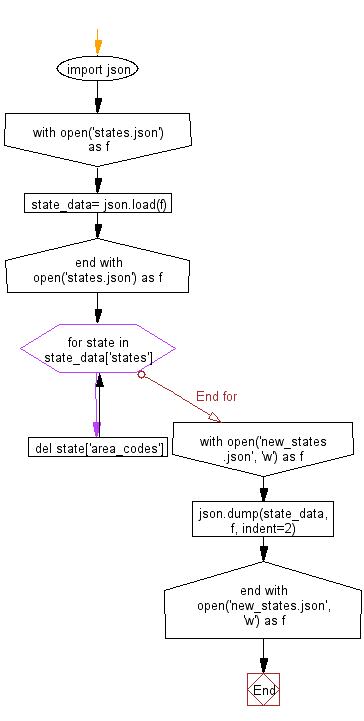Python JSON: Create a new JSON file from an existing JSON file
Python JSON: Exercise-6 with Solution
Write a Python program to create a new JSON file from an existing JSON file.
Sample Solution:-
Python Code:
import json
with open('states.json') as f:
state_data= json.load(f)
for state in state_data['states']:
del state['area_codes']
with open('new_states.json', 'w') as f:
json.dump(state_data, f, indent=2)
Output:
new_states.json
{
"states": [
{
"name": "Alabama",
"abbreviation": "AL"
},
{
"name": "Alaska",
"abbreviation": "AK"
},
{
"name": "Arizona",
"abbreviation": "AZ"
},
{
"name": "Arkansas",
"abbreviation": "AR"
},
{
"name": "California",
"abbreviation": "CA"
},
{
"name": "Colorado",
"abbreviation": "CO"
},
{
"name": "Connecticut",
"abbreviation": "CT"
},
{
"name": "Delaware",
"abbreviation": "DE"
},
{
"name": "Florida",
"abbreviation": "FL"
},
{
"name": "Georgia",
"abbreviation": "GA"
},
{
"name": "Hawaii",
"abbreviation": "HI"
},
{
"name": "Idaho",
"abbreviation": "ID"
},
{
"name": "Illinois",
"abbreviation": "IL"
},
{
"name": "Indiana",
"abbreviation": "IN"
},
{
"name": "Iowa",
"abbreviation": "IA"
},
{
"name": "Kansas",
"abbreviation": "KS"
},
{
"name": "Kentucky",
"abbreviation": "KY"
},
{
"name": "Louisiana",
"abbreviation": "LA"
},
{
"name": "Maine",
"abbreviation": "ME"
},
{
"name": "Maryland",
"abbreviation": "MD"
},
{
"name": "Massachusetts",
"abbreviation": "MA"
},
{
"name": "Michigan",
"abbreviation": "MI"
},
{
"name": "Minnesota",
"abbreviation": "MN"
},
{
"name": "Mississippi",
"abbreviation": "MS"
},
{
"name": "Missouri",
"abbreviation": "MO"
},
{
"name": "Montana",
"abbreviation": "MT"
},
{
"name": "Nebraska",
"abbreviation": "NE"
},
{
"name": "Nevada",
"abbreviation": "NV"
},
{
"name": "New Hampshire",
"abbreviation": "NH"
},
{
"name": "New Jersey",
"abbreviation": "NJ"
},
{
"name": "New Mexico",
"abbreviation": "NM"
},
{
"name": "New York",
"abbreviation": "NY"
},
{
"name": "North Carolina",
"abbreviation": "NC"
},
{
"name": "North Dakota",
"abbreviation": "ND"
},
{
"name": "Ohio",
"abbreviation": "OH"
},
{
"name": "Oklahoma",
"abbreviation": "OK"
},
{
"name": "Oregon",
"abbreviation": "OR"
},
{
"name": "Pennsylvania",
"abbreviation": "PA"
},
{
"name": "Rhode Island",
"abbreviation": "RI"
},
{
"name": "South Carolina",
"abbreviation": "SC"
},
{
"name": "South Dakota",
"abbreviation": "SD"
},
{
"name": "Tennessee",
"abbreviation": "TN"
},
{
"name": "Texas",
"abbreviation": "TX"
},
{
"name": "Utah",
"abbreviation": "UT"
},
{
"name": "Vermont",
"abbreviation": "VT"
},
{
"name": "Virginia",
"abbreviation": "VA"
},
{
"name": "Washington",
"abbreviation": "WA"
},
{
"name": "West Virginia",
"abbreviation": "WV"
},
{
"name": "Wisconsin",
"abbreviation": "WI"
},
{
"name": "Wyoming",
"abbreviation": "WY"
}
]
}
Flowchart:

Python Code Editor:
Have another way to solve this solution? Contribute your code (and comments) through Disqus.
Previous: Write a Python program to convert JSON encoded data into Python objects.
Next: Write a Python program to check whether an instance is complex or not.
What is the difficulty level of this exercise?
Test your Python skills with w3resource's quiz
Python: Tips of the Day
Python: Unknown Arguments Using *arguments
If your function can take in any number of arguments then add a * in front of the parameter name:
def myfunc(*arguments): for a in arguments: print a myfunc(a) myfunc(a,b) myfunc(a,b,c)
- New Content published on w3resource :
- Python Numpy exercises
- Python GeoPy Package exercises
- Python Pandas exercises
- Python nltk exercises
- Python BeautifulSoup exercises
- Form Template
- Composer - PHP Package Manager
- PHPUnit - PHP Testing
- Laravel - PHP Framework
- Angular - JavaScript Framework
- React - JavaScript Library
- Vue - JavaScript Framework
- Jest - JavaScript Testing Framework
